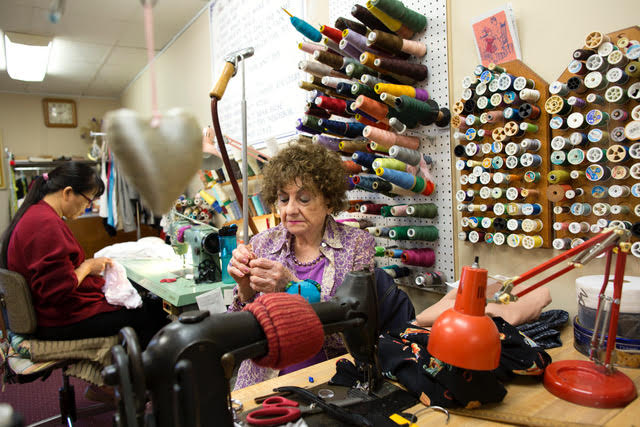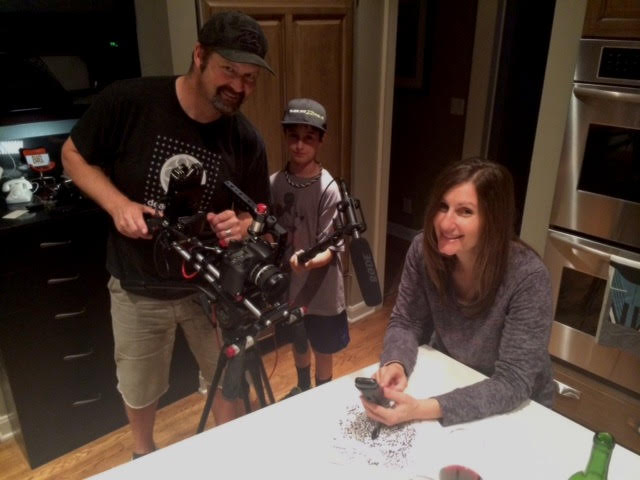Click here to read the full article by Alex Landers on Directed By Women.
#DirectedbyWomen team member Alex Landers recently had the great fortune to speak with Leah Warshawski, director of the award-winning documentary Big Sonia, as the film’s team works to distribute the festival favorite to theaters across the country. Her previous feature Finding Hillywood put the spotlight on Rwandan filmmakers. In Big Sonia, Warshawski turns the camera on Sonia – a 91-year-old public speaker, successful tailor-shop owner, and neighborhood icon, who also happens to be a Holocaust survivor – and her own grandmother.
DBW: First of all, why film? Why did you choose film to be your medium?
LW: Well, I think film chose me. I didn’t really have a direct path into filmmaking; I never went to film school. But I consider all of my experience in the industry film school, and I’d say I’m definitely still learning and have a way to go, always. I don’t think you ever stop learning, which is one of the reasons I love what I do, because there’s always more to learn and it changes so much. I went to college for Japanese. I studied Japanese and thought I would live in Japan and teach English, and ended up meeting someone in the film industry that gave me an opportunity to work in the industry, doing a lot of different jobs, right out of college. I started working on bigger, kind of narrative projects: features and t.v. shows. And along the way found that documentary storytelling, the access that it gives you to the world, and the fact that people entrust you with their stories, really kind of spoke to me at a core level and spoke to my soul in a way that narratives just don’t do. Although I love both – I love the process of both – but I think documentaries really kind of feed my brain and feed my soul. I wasn’t planning this path, it kind of happened to me, and I think film found me instead of the other way around. I love what I do most days.
DBW: Well that’s the best, that’s the goal, right? To love what you do?
LW: Yeah, if you like it 75% of the time you’re doing good.
DBW: What about storytelling, and maybe particularly oral and visual storytelling, is interesting to you? What’s the importance of it?
LW: Storytelling in a film leaves a legacy. Once you have something created and put onto record, it’s there forever and it doesn’t go away. So you’re leaving a legacy and you’re leaving a mark. And then, in terms of storytelling that’s passed down, I think humans have been telling stories and passing things down through stories forever and ever. And if the stories aren’t told, either spoken or recorded, then they go away and nobody knows and nobody remembers. So we do feel a responsibility when we hear of an interesting story or when we hear something unique or something that you feel needs to be told; it becomes a responsibility to tell it in the best way that you can, because you want to make sure that it gets out. And if you can tell it in a way that impacts people emotionally, then they never forget that story – and so that’s always our goal.

DBW: Part of the reason I wanted to do this interview with you [is because] my Aunt was a Holocaust survivor, as well. We’re not a particularly religious family, but Jewish tradition was very important. Do you feel that Judaism [has] affected you? Does it affect the film?
LW: We set out to make a non-Holocaust Holocaust movie. Believe it or not, we actually weren’t talking about the holocaust at all in the film; in the beginning, we started making a short film more about the shop. And it was the elephant in the room. We certainly didn’t want to talk about it, we didn’t want to dive into it – it was just too painful, there’s too much around it. Holocaust stories have been told before, and we really didn’t want to go down that path. Especially after our last film, we wanted to try and do something a little bit lighter. Naively, we thought we could tell a story about a Holocaust survivor without mentioning The Holocaust. So, it turned into this multi-layered story, and one of the things that people are actually responding to the most is the story about the second generation and how trauma affects families. And it’s become relatable and universal in a way that we didn’t anticipate when we started. It’s not just about The Holocaust, or survivors, or people who are Jewish; it’s about anyone who has a family, anyone who has had any kind of challenge or trauma in their life, [they] relate to what Sonia and her kids are going through. That’s really the joy for us, because we don’t want the film to be only relatable to Jewish people. You know, I had a bat mitzvah, I went to Hebrew school, but… after that I kind of lost that culture and identity, and I think that’s common. The film hasn’t made me more Jewish, but it’s definitely brought our family closer together, because – not that we know everything about each other… there’re still plenty of secrets – I think it’s opened up conversations that nobody really wanted to have before.
DBW: It must be really interesting to film your family, and to create a documentary, a story, that involves them directly.
LW: Yeah, that’s a whole other film!
DBW: Was it difficult for you? Was it joyful?
LW: Both. It was both difficult and joyful. It’s the most time that I’ve ever spent with my family. Ever in my life. Because I didn’t grow up in the same place as my grandmother. I left home pretty quickly as soon as I could, just to kind of go and see the world. Making the film in six years [now] – we’ve been to Kansas City and spent more time with my grandmother then I ever have. That’s a blessing and a curse, for many reasons. We always joke that the next film is going to be about penguins or whales. We just really didn’t think that it would become so involved. But it has been a blessing just because I didn’t know my family very well before. And, not that I know them very well now, but I know them better and it’s been a blessing being able to spend time with them, in a way that I don’t think I could have when I was younger; I wasn’t ready to do that.
DBW: I know it’s a documentary, but immediately from the first bit of the trailer, [Sonia] is a character. And [there’s talk about] her reason for being and what pushes her forward, and it really seems like that shop does – that it’s her purpose. So, I wonder, in making the film and in sending it out into the world, how do you feel? Do you hope that we can look at that outlook and apply it to our own lives? What do you think Sonia has to teach us?
LW: After hearing Sonia’s story, no matter what, you do kind of look at your own life in a different way. You look at your own challenges differently, because she’s an embodiment of someone who’s survived the worst of the worst and still getting up and going to work every day. A lot of people use that to inspire them to get through whatever they’re going through, and that’s what we saw initially, which sparked us to make the film. We saw the way that she affects people; we call it the “Sonia Effect.” And whether that’s pure or not, I think people see her for their own redemption. People meet Sonia for ten minutes and their lives are changed. And we’ve literally seen that; we’ve been there for that. People see whoever they want to in her. They see their own grandparents, they see the grandparents they never had, they see the grandparents they’ve always wanted. They see parts of themselves or their parents. She has a unique ability to make people feel like they’re the most important person in the world… There aren’t many people I know that can do that. I’ve always said, I want that; no matter what I would love to have more of that. She’s a people person, she’s really good with people. The most ironic part is that she doesn’t have a great relationship with her family. But to the outside world she is an icon. She’s an enigma. We’re not even projecting anymore what we want people to take away, now we’re just talking about what people seem to be taking away. We’ve been screening since November and every time we screen the film people will come up and tell us that they think they’re going to have an easier time getting through whatever they’re going through; they can’t complain anymore because what Sonia went through was so bad, and look at her! And if she can do it, we can do it. And… they relate to the second generation. There’s a lot of second generation who grew up with parents who were survivors who never talked about it—never felt they could talk about it… felt like my problems can never be as bad. The fact that Sonia is vulnerable in our film shows people that she’s just human; that we’re all human. And yes, she’s doing incredible things in the world, but also, she’s very damaged, and people relate to that.
DBW: I think that’s an important message for right now, too. We should see everyone as human. And about… communication between generations—I feel like as an older millennial myself, there’s a lot of anxiety and tension right now between the baby boomer generation and mine, thinking we can’t have a dialogue. Do you feel that the film can help mend that? That [seems to be] the work that Sonia is doing day to day. How can the film continue that work?
LW: We’re hoping that we can partner with some organizations that do that. There’s an organization already that partners survivors with teens called “Facing History in Ourselves,” – they’re doing exactly what we want to do with the film. We also have Film Sprout as a partner: we’re trying to raise money right now through crowdfunding to hire them this fall. They’ll try and book as many community screenings, panel discussions, and community events as possible around the film to open up some discussions. We’re making an educational version with discussion guides that will go to classrooms. Just trying to screen it for the broadest audience that we can and encourage families to come. It’s a 13 and above film, but we do encourage, at all of our screenings… families. In some cases, people come and then they bring back their family the next day.

DBW: How has the crowdfunding experience been for you?
LW: We’re just on week two right now. We raised all of the money to make the film and finish it through grants and donations over the last six years, but distributing a film is really tough and expensive. [For Big Sonia] we’re using Women You Should Fund because it’s a new platform – it’s just like Kickstarter but it’s for female creators and female based projects. Their umbrella organization is called Women You Should Know and it’s a cool social media [community].
We just met with them in New York, and they give a lot of personal attention, and we just thought, if we’re going to crowdfund for Big Sonia we want to do something different. We didn’t want to use Kickstarter or Indie Go-Go again. We just felt like in order to keep ourselves interested we need to keep things moving and keep things new and fresh… And just about the time we were struggling with “how are we going to do this,” I got an email from [Women You Should Fund]. And we thought, oh my gosh, this is a perfect fit. They’re just amazing women who run it and they’re so incredibly supportive; there’s no other crowdfunding platform that gives as much support as they’ve given us in the last month. [Crowdfunding is] stressful, but… we just feel so strongly about getting the film to theaters, and we want to be eligible for an Academy Award this year, so we’re under a tight deadline, and the only way to do that is with money.
DBW: Are there other women directors who have inspired you? What other women [in the industry] have you worked with that we should know about, that maybe we don’t?
LW: When I was coming up in the big narrative feature world it was still all run by men; all the directors I worked with were men. I worked with great female producers on Lost. Unit production manager Pat Churchill, who is amazing, was an inspiration… [She’d] been in the industry forever and ever and I really looked up to [her]. For documentaries, if we’re making our own, we’re working for ourselves, and so we get to hire all of our crew, and I try to hire female crew when I can and when it makes sense. But most of the people I work for, if I do a contract job, are still men, so that’s a tough one. I surround myself with a community of really strong, inspiring women. [I] have a friend named Jane Charles who made a film recently called Sold, about child trafficking in Nepal. She’s an inspiration and a mentor to me, and she just continues to inspire me and amaze me with the work that she’s doing… She’s one of those people – she’s a powerhouse, but she’s [also] the calmest, nicest person. It’s rare to find people like that.
DBW: It’s been such a pleasure to talk with you. How else can we help you get Big Sonia into theaters?
LW: The hardest part is with crowdfunding, and especially [because] we’re trying something new [with Women You Should Fund]… But we know that you have to take risks as an innovator and we feel strongly about trying something different… Can you just pledge even $10, something, [and then] share it; to say, “I pledge $10, can you do this, too?”
Help bring Big Sonia to the big screen by supporting their Women You Should Fund campaign. They’re working to raise $75,000 before July 4, 2017.
